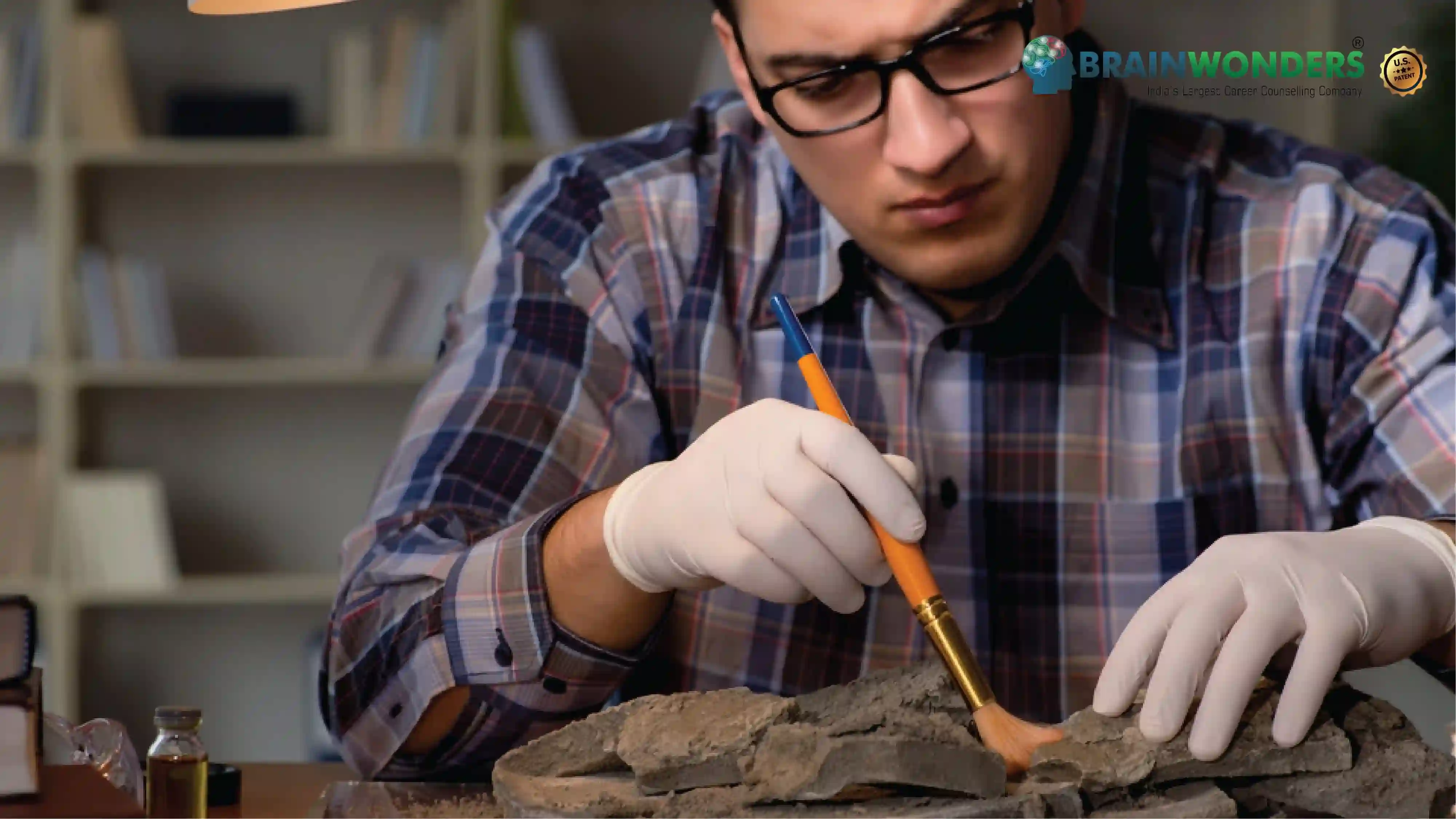How to become an Archaeologist
Overview, Courses, Exam, Colleges, Pathways, Salary

Overview
Who is Archaeologist ?
In the field of archaeology, an archaeologist is someone who brings together knowledge of geography, history, and anthropology with knowledge of geology, art, chemistry, and literature to form a scientific discipline of study known as archaeology. An archaeologist may work in a variety of settings. The recovery, investigation, and documentation of past materialistic remains is how ancient human civilisations are discovered and documented. Historically, archaeology has been defined as the study of ancient human societies.
Among other things, it entails the examination of environmental data acquired during excavation. This includes artefacts and constructions uncovered during excavation as well as landscapes and biofacts, among other things. Among the many important branches of Archeology that ought to be mentioned are epigraphy, museology, archives, and numismatics. These are only a few examples of many more. An archaeologist`s knowledge is gained via the use of a range of procedures such as surveying, recovering, analysing, and documenting findings.
Finding and experiencing history is the ultimate objective of an archaeologist`s career; this in and of itself is an exciting activity in and of itself. They are also the ones that are in charge of doing a study into the ways of ancient civilizations. In order to do their study, they must first undertake a thorough analysis of the customs, values, and social trends in the area. In order to pursue a career as an archaeologist, you may choose from a variety of specialised disciplines available in the field, including archaeometry, bioarchaeology, historical archaeology, ethnoarchaeology, and other related areas of study. Furthermore, they make considerable use of modern tools and technologies in the course of their work.
Typical day at work
What does Archaeologist do?
If archaeologist is the career of choice then the following must be certainly kept in mind:
- They must conduct surveys in multiple sites using diverse methods and instruments.
- They need to manipulate the data using drawings, notes and photography.
- They maintain, restore and clean excavated items.
- They collect data about the archaeological site and keep a thorough record of the same.
- They perform archival research, tests and evaluation for data collection purposes, which helps them know about the site better.
- They are also responsible for making presentations to the public in the form of workshops, seminars, discussions, conferences, etc
- They are also accountable for the afterwork of excavation, i.e. washing, bagging and labeling artifacts.
- They keep a check on new laws and regulations related to cultural resource issues with the project team.
Abilities and Aptitude needed
What are the skills, abilities & aptitude needed to become Archaeologist?
This vocation might need a significant amount of formal schooling. Education: Earning a master's degree or a PhD in archaeology from a reputable university is almost mandatory. Most professions need at least a master's degree, but others — notably those that entail teaching at a college or university or that demand advanced technical or leadership abilities — necessitate the completion of a doctoral degree to be considered. Can you obtain a job with a bachelor's degree in archaeology if you don't have any experience? Yes, but there are just a few alternatives.
However, you will only be able to get employment as a field technician, laboratory technician, or research assistant if you have previous work experience, such as via an internship. Even after earning an advanced degree, though, this kind of work experience may be quite beneficial to you. Proficiencies and abilities of an archaeologist Archaeologists need a variety of soft skills and personal characteristics as well. Some abilities may be learnt, while others are natural.
Communicative and writing abilities: Archaeologists must be able to communicate well, both verbally and written since they are often required to explain their work clearly and succinctly to other people. Active listening abilities: Having strong listening skills can assist you in communicating more effectively with coworkers.
Critical thinking abilities: To solve issues and make choices, you must apply to reason.
Reading comprehension: The ability to comprehend written content will be beneficial to you while you do research. As a result of the time commitment required to accomplish various tasks, perseverance will be a valuable trait to possess.
Active learning: Your drive to learn and your ability to integrate new results into your work will enable you to advance your research. Physical stamina is essential since you will be asked to bend, kneel, stand, trek, and stand for lengthy periods, frequently while carrying field and personal gear. Mental stamina is also required.
Salary
Salary for Archaeologist?
The salary of an "Archaeologist" can vary based on factors such as education, experience, location, the employer (e.g., government, academia, private organizations), and the specific role within archaeology.
- Minimum Monthly Salary: The minimum salary can be from INR 20,000 to INR 40,000.
- Maximum Monthly Salary: The maximum salary can be from INR 80,000 to INR 1,50,000 or more.
- Annual Salary: The annual salary can be from INR 2,40,000 to INR 18,00,000 or more.
- Highest Paying Job and Scope: The highest paying job for archaeologists is often university-level teaching and research positions as tenured professors or research scientists. The scope for archaeologists is diverse, as their expertise in studying human history and past civilizations is valuable in various fields.
Pathways
How to become an Archaeologist?
Entrance Exam
Entrance Exam for Archaeologist ?
Candidates who wish to join the Postgraduate courses in Archeology have to appear for the Postgraduate Entrance Tests (PET). The admission is based on the merit scored in the PET exam, the eligibility requirements and the availability of seats. Those candidates who complete the course successfully can find employment in the Archaeological Survey of India in its exploration, epigraphy, pre-history, excavation and in the branches of the museum too. For these jobs, the ASI diploma is a necessity. The Recruitment of candidates through exams is conducted by the Union Public Service Commission (UPSC) and the State Public Service Commissions (SPSC).
Courses
Which course I can pursue?
Best Colleges
Which are the best colleges to attend to become an Archaeologist?
Industries
Which Industries are open for Archaeologist?
- Archives
- Research Organizations
- Research Institutions
- Court Houses
- Historic Sites
- Museums
- National Parks
- Universities
- Under water Archaeology Wing
- Libraries
- Institutions
- Tourism Industry
- Publishing Houses
- Cultural Centers
- Defense Services
- Archaeological Survey of India (ASI)
- National heritage agencies
- Indian Council of Historical Research (ICHR)
- Government and private museums and cultural galleries
- Universities and colleges
internship
Are there internships available for Archaeologist?
The aspirant needs to prepare themselves with years of training, attending tests and examinations, writing term papers and thesis and conduct research continuously. To the other side of this, there will also be field work where the candidates shall learn to examine the excavation of places, analyzing the relics and monuments recovered, learn new techniques of excavation, intern with a senior Archaeologist, put into practice the using of GPS tools, digging and drawing & photography.
Career outlook
What does the future look like for Archaeologist?
The work opportunities for persons with an archaeological background are many, both in the public and private sectors. People who are interested in exploring past human civilisations and the living conditions that existed thousands of years ago are more likely to be offered opportunities in this field of study. It is possible to get the position of an archaeologist by passing a test offered by the Union Public Service Commission or the Staff Selection Commission, despite the number of accessible positions in the country for the work function in question is quite limited for the national average.
Archaeologists will be required to oversee building projects to ensure that builders adhere to federal standards related to the protection and treatment of archaeological and historical items, among other responsibilities. Fieldwork is an important aspect of an archaeologist`s job description. You may anticipate spending at least a few weeks of each year travelling, with a major number of those hours spent in the great outdoors. Certain of an archaeologist`s job cannot be accomplished while the weather is adverse, but heat and sun in some climes may make it uncomfortable to be out in the field.
Travelling and site visits are two activities that need a significant amount of physical effort when performed in the great outdoors. The job may be quite rewarding for those who are passionate about a certain subject, but it should be emphasised that this is a niche field, which means that employment opportunities may be restricted as a consequence of the narrow scope of the field.






